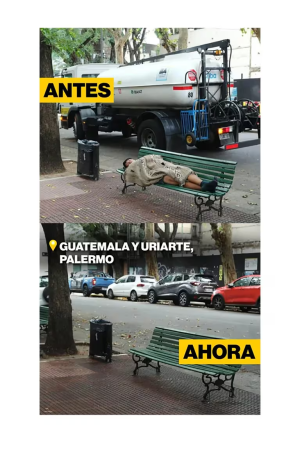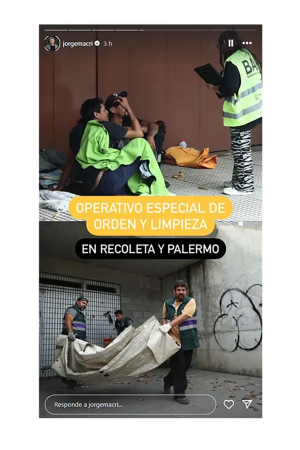All the Answers
Well-known member
The Buenos Aires government defended the operations with homeless people that generated controversy - Infobae

Source:

El gobierno porteño defendió los operativos con personas sin techo que generaron polémica
El ministro de Seguridad, Waldo Wolff, dijo que les ofrecen ir a un centro de inclusión, pero que desalojarán a quienes “hacen sus necesidades” en la vía pública o son denunciados al 911. Ayer hubo críticas a Jorge Macri por compartir fotos de los procedimientos
April 25, 2024
The Minister of Security, Waldo Wolff, said that they are offered to go to an inclusion center, but that they will evict those who "relieve themselves" in public or are reported to 911. Yesterday there was criticism of Jorge Macri for sharing photos of the procedures

Operativo CABA con personas en situacion de calle
El jefe de Gobierno porteño, Jorge Macri, compartió los operativos de "orden y limpieza" con personas en situación de calle
cdn.jwplayer.com
The head of the Buenos Aires Government, Jorge Macri, shared the "order and cleanliness" operations with people living on the street
The Buenos Aires Minister of Security, Waldo Wolff , today defended the operations carried out by the City of Buenos Aires with people living on the street, after the publications made in the last few hours by the head of Government, Jorge Macri , which He presented them as procedures for “ order and cleanliness” of public spaces.
Yesterday, Macri shared on his Instagram account how the Buenos Aires government acts against the “ranchadas” of homeless people on public roads, with photos that show the before and after. “ Special order and cleaning operation in Recoleta and Palermo ”, He titles one of the stories. The image combines two photos. In the top one, you can see homeless people being interrogated by staff from the City of Buenos Aires, and in the bottom one, the moment in which they remove the homeless people's belongings. These are interventions carried out in the neighborhoods of Recoleta and Palermo .
Wolff confirmed that the crews that operate in this type of cases "have increased" given the situation that there are "more people on the streets due to the vast majority coming from the Buenos Aires suburbs." “We have more from Monday to Thursday than on weekends. Somehow, they come to try to survive (to the City) by begging, others by selling or cardboarding,” he noted.
“He who is relieving himself or bothering people is invited to leave ,” he said in statements to radio Urbana Play , in the program “De Acá en más.”
According to the official, the operations carried out by the City government with the Buenos Aires Presente (BAP) program “are not compulsive” or mandatory, and that they offer indigent people who live on public roads to go to a social inclusion center. But he pointed out that, unlike the previous administration, a greater number of searches are carried out in response to complaints of violent situations. “We have increased searches by 657% for seizure of blades or some tip ,” he pointed out, and stressed that “the person is asked to show his belongings if there is a complaint.”

The "before" and "now" of operations with homeless people
“ What we do is look for a balance . For those who allow themselves to be helped and want to go to a center, the City has all the elements to do so. To those who discover an element that justifies being prosecuted, we do so; and whoever relieves himself in the street and bothers people is invited to leave, because we are giving him the possibility of containing him. If he doesn't want to do it (be assisted), we can't do more," said Wolff.
Asked about the posts of the head of the Buenos Aires Government, who received criticism for the crudeness of the images with “the before and after”, the Minister of Security responded: “It also makes me sad ; The City is deeply concerned, which is why we have 3,700 people in inclusion centers. But as Minister of Security, if someone calls 911 for a person who is relieving themselves or has a tip or a faca, I am going to go get them out .”
In one of the official images that sparked the controversy, there is a person sleeping on a public bench on a sidewalk in Guatemala and Uriarte. Then another photo appears below where the person is no longer there. The same sequence occurs with another publication, where another person is portrayed sleeping on the sidewalk of a rental premises, on the corner of Godoy Cruz and Emilio Zolá passage. In the second image, that same person is no longer there. A video with these procedures was also published in public space.
“ We respond to the complaints of neighbors and guarantee the cleanliness and safety of public spaces, our squares and sidewalks ,” the head of Government published in one of the posts in the feed. In another he pointed out that these special operations “involve the Public Space Planning area, the City Police, members of the Buenos Aires Presente program and the intensive cleaning crew.” “If you see a person homeless, contact Boti,” says the last of the Instagram stories.
The repudiations and criticisms of Jorge Macri on social networks
The Buenos Aires mayor's publications provoked a reaction from former officials, opposition legislators and human rights organizations, who repudiated this type of actions.The former Minister of Human Development of Buenos Aires, María Migliore , who was part of Horacio Rodríguez Larreta 's management and was in charge of the BAP program, expressed her disagreement with the official communication: " We cannot show people in street situations as if they were a object to be moved to clean a place .”

One of the posts published by Jorge Macri about the operations in public spaces
“Do you remember seeing the city as dirty as it has been in the last 4 months? However, it seems to @jorgemacri that “order and cleanliness” means sweeping away people who live on the street. Look at the publication he made today on networks. It's not a joke, it's the official account,” shared the Unión por la Patria legislator, Maru Bielli , on her personal X account.
“Hello @jorgemacri. I think it's very good that you clean the city a little... But do you realize that in this video you are putting homeless people on the same level as GARBAGE ? ", said the former candidate for head of Government of UP, Leandro Santoro .
The Center for Social and Legal Studies (CELS) also made an allusive post: “ It is not a problem of “order”, “cleanliness” or “security”, as Jorge Macri says on his social networks. They are not trash, nor criminals. “They are people who do not have housing in the City of Buenos Aires and deserve a humane response.”


